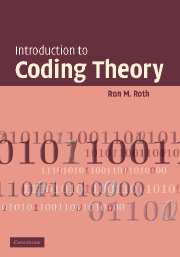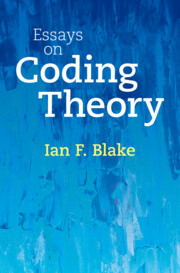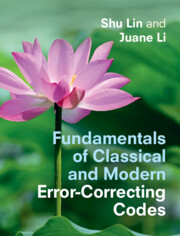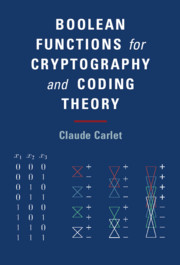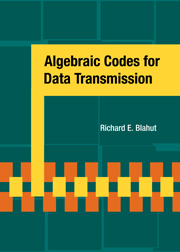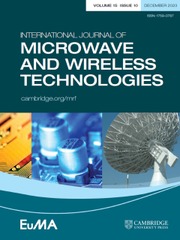Introduction to Coding Theory
Error-correcting codes constitute one of the key ingredients in achieving the high degree of reliability required in modern data transmission and storage systems. This book introduces the reader to the theoretical foundations of error-correcting codes, with an emphasis on Reed-Solomon codes and their derivative codes. After reviewing linear codes and finite fields, Ron Roth describes Reed-Solomon codes and various decoding algorithms. Cyclic codes are presented, as are MDS codes, graph codes, and codes in the Lee metric. Concatenated, trellis, and convolutional codes are also discussed in detail.
- Contains classical introductory material and classical research material as well as more recent developments
- Accessible to computer scientists, electrical engineers and mathematicians
- Contains over 340 exercises (many with hints) and over 100 worked examples
Reviews & endorsements
"[T]his volume is a most welcome addition. It has many features that are distinctive and it is clear from the approach and treatment of the key topics that it has been well tested as a course text. These features include the extensive collections of interesting and nontrivial problems at the end of chapters, the clear and insightful explanations of some of the deeper aspects of the subject and the extensive, interesting, and useful historical notes on the development of the subject...This is an excellent volume that will reward the participants in any course that uses it with a deep understanding and appreciation for the subject."
Ian F. Blake, University of Toronto
The book is a nicely written, comprehensive introduction to coding theory. I really appreciate the fact that the volume seems intended not just as a textbook for a first course in coding theory, but rather as a book that can be used in several courses at different levels, and as a useful resource for the reader. Moreover, even though the book is intended for undergraduate students in several fields, the mathematical rigor has been kept intact.
Alvar Lozano-Robledo, H.C. Wang Assistant Professor, Cornell University, MAA Reviews, MathDL
"Altogether this is an excellent book covering a wide range of topics in this area, and including an extensive bibliography."
L.V. White, Imperial College of Science, Technology and Medicine, ISI Short Book Reviews
"This book is a very good textbook on error correcting coding, containing both classical and advanced research material. It is written in an exact mathematical style and contains many exercises and examples. The book can be recommended for students of computer science and electrical engineering at the advanced undergraduate and graduate levels as well as all professionals working on digital communication systems."
Andrzej R. Pach, IEEE Communications Magazine
"The mathematical style of this book is clear, concise and scholarly with a pleasing layout. There are numerous exercises, many with hints and many introducing further new concepts. Altogether this is an excellent book covering a wide range of topics in this area, and including an extensive bibliography."
International Statistics Institute, Short Book Reviews Online
Product details
May 2012Adobe eBook Reader
9781139415323
0 pages
0kg
66 b/w illus. 12 tables 348 exercises
This ISBN is for an eBook version which is distributed on our behalf by a third party.
Table of Contents
- Preface
- 1. Introduction
- 2. Linear codes
- 3. Introduction to finite fields
- 4. Bounds on the parameters of codes
- 5. Reed-Solomon codes and related codes
- 6. Decoding of Reed-Solomon codes
- 7. Structure of finite fields
- 8. Cyclic codes
- 9. List decoding of Reed-Solomon codes
- 10. Codes in the Lee metric
- 11. MDS codes
- 12. Concatenated codes
- 13. Graph codes
- 14. Trellis codes and convolutional codes
- Appendix A. Basics in modern algebra
- Bibliography
- List of symbols
- Index.

